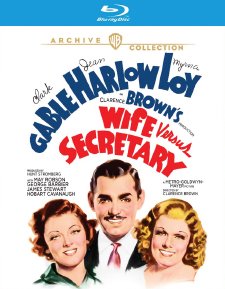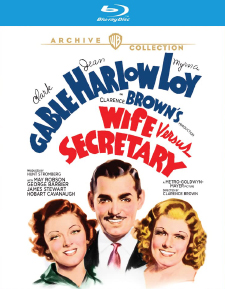Wife vs. Secretary (Blu-ray Review)

Director
Clarence BrownRelease Date(s)
1936 (January 24, 2023)Studio(s)
MGM (Warner Archive Collection)- Film/Program Grade: A
- Video Grade: A-
- Audio Grade: A
- Extras Grade: B-
Review
Wife vs. Secretary (1936) is an unexpected delight. I anticipated something akin to Libeled Lady (also 1936), the great screwball comedy starring, as here, Jean Harlow and Myrna Loy. One can be forgiven for thinking a movie called Wife vs. Secretary would be screwball, wouldn’t you think?
Instead, though the film, really a romantic drama, has the usual MGM gloss and involves an overly familiar love triangle, husband-wife-secretary (more precisely, a quadrangle, the secretary’s boyfriend added to the mix), it’s told with great subtlety and intelligence, with progressive and even feminist themes, none of these adjectives normally applicable to conservative, middle-brow MGM of the 1930s. (The picture’s fine director, Clarence Brown, was also notoriously conservative.) Clark Gable headlines the film, with Harlow successfully breaking away somewhat from her street-talking, platinum-blonde image in an impressive performance. James Stewart is billed sixth but is really the fourth lead, and he’s excellent also.
Millionaire magazine publisher Van Stanhope (Gable) is blissfully married to Linda (Myrna Loy), they celebrating their third wedding anniversary as the film opens. Much of his success is due to his crack secretary, Helen “Whitey” Wilson (Harlow), she devoted to her boss while engaged to working man Dave (Stewart).
Whitey is proactive and emphatically professional, utterly invaluable to Van. The problem is she’s also younger and sexier than all the other women in the company’s secretarial pool. The terrific screenplay by Norman Krasna, John Lee Mahin, and Alice Duer Miller (from Faith Baldwin’s same-named story) has all four characters behaving like responsible adults. Van and Linda love and trust one another, she unconcerned that her husband spends more than half the day with another woman. But at the office and at parties Van and Linda host or attend, friends and co-workers invariably gossip and speculate about Whitey’s relationship with her boss. Van, for his part, is logical yet naïve about the optics. “Since when,” he asks Linda, “do we care what people think?”
Dave surprises Whitey with news he’s been given a substantial raise at work. Now, when they get married, he argues, she won’t have to work anymore. Whitey surprises him by refusing to put in her notice—she likes her stimulating job. Dave, not unreasonably, is concerned that the glamour of working for millionaire Van may be setting Whitey up for a huge disappointment. She’s not part of that world and, after all, is merely an employee.
Linda, meanwhile, can’t help but wonder about Van’s fidelity, since Van thinks nothing of dancing and ice skating with Whitey in public and, in the film’s third act, flies her down to Havana for a business convention, she in his room well past midnight. Van may be unconcerned with how this might be perceived, but his overconfidence in that regard borders on irresponsibility, especially when both Van and Whitey begin to think that, just maybe, something more than a boss-secretary relationship might be possible.
All four principal characters are smartly written. Dave might easily have been the jealous, possessive type, but the script, aided by Stewart’s sensitive performance, make his frustrations entirely rational. Van expects Whitey to be on-call 24/7, and he understandably resents him calling her into work at all hours, such as when they have theater tickets, Dave blaming Van for his unreasonable expectations, but also Whitey for her unhesitating willingness to jump anytime he calls, she craving the excitement of his world.
Van, for his part, is a loving husband, but he’s maybe just a tad conceited, thinking he can have both women in his life (if serving entirely different purposes) exactly the way he wants without really considering their feelings, Linda especially.
Whitey is, by 1930s Hollywood standards, a much more realistic career woman, with believable shading. Her boss busy, she sits alone in a nightclub awaiting his return when she eyes a couple at a nearby table, very much in love. Without dialogue Harlow beautifully expresses Whitey’s realization, perhaps for the first time, that her career is getting in the way of quiet moments like this with Dave. Though long an admirer of her talents, I was never particularly a Harlow fan until this film. Her final moments in the picture, a half-smile Whitey gives to Linda, is quite touching and beautifully realized.
Too often with such stories, the wife is an unholy shrew and the boyfriend is a jerk, allowing the girl to run off with her man in the end, or the boss turns out to be philander keeping another woman hidden until the third act, or the girl does an abrupt turnabout yearning for motherhood and domesticity. None of this happens in Wife vs. Secretary, which keeps its characters, all four, smart and likable until the fade-out.
Warner Archive’s Blu-ray of Wife vs. Secretary (not Wife versus Secretary) is a solid encoding, presented in black-and-white, 1.37:1 standard format. The opening titles are a tad soft, but the rest of the film looks great, comparable with other Warner Archive MGM titles of the period. The English DTS-HD Master Audio (2.0 mono) is also above average, and the Region-Free disc is offered with optional English subtitles.
Supplements are limited to a two-reel entry in MGM’s Crime Does Not Pay series, The Public Pays (1936), partly re-using sets leftover from the feature attraction. Sourcing an old master, it runs 18:20. Also included is an original trailer (2:40).
I don’t know how I missed this one through the years, but Wife vs. Secretary is excellent, and an anomaly among MGM’s A-pictures from the period. Really, a must-see.
- Stuart Galbraith IV

